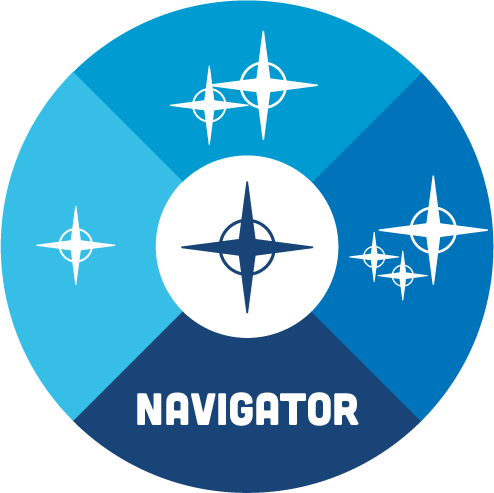
Lost at Sea
Wicked problems are those without a definitive answer. They can be one of the trickiest problems since everyone’s situation is unique to them. To help guide you we collected stories from students in similar situations, their advice to you and how they overcame it.
This is a story about feeling lost and overwhelmed throughout university due to a lack of guidance on navigating life.
The Wicked Problem
Throughout my undergraduate studies and into graduate school I continued to feel “lost at sea”. There was the first year (which many students can relate to I’m sure) which involved throwing 18 year old’s out into the sea to see if they swam or sank. There was the sea of “finding friends at frosh”, “keeping up with readings in classes with 1000+ other fish”, “learning to be in charge of your own health and meals”, “withstanding ego damage as the class average rolled out at a B-“, “everyone wants to be a Doc, but not everyone will make it”, and many more treacherous waters. I kind of felt like Nemo jumping into the East Australian Current with no idea of how to get out or where I was going.
First year was a blur, duuuude. I was also used to being the big fish in a small pond in my hometown, and here I was in a new city amongst the entire Sea Anemone! In addition to feeling lost in my pre-med classes, I felt lost in life. What am I doing here? Why am I taking Calc 2? What is this degree actually going to help me with? I realized that my previous decisions to attend University and shoot for med school were mostly made by “following the other fish”. I didn’t really reflect on my “WHY”. Why are you HERE? At this school. Taking this program. In this city. With these people. Even bigger – Why are you here in this LIFE. This feeling of being “lost in academia” didn’t go away after graduating my undergrad. It continued into grad school and really matured into “lost in life” once I entered the working field. You see, I never really had any courses on “character development” or “aligning your values with your purpose” or “knowing WHO you are and WHAT you stand for”. No-one ever taught me about the importance of voicing my values as they related to academia. I felt like my entire education something was missing in helping me feel like I had a compass to navigate being “lost at sea”. This is a wicked problem because if I DID have a compass to return to each time academia made me doubt myself, I would have struggled so much less!
Finding a Solution
So here is my advice (to myself and to others – students or academic members):
- Make connections between academic tasks/experiences and your core values. You value community? Great! Get involved in clubs and group studies. Find your community by attending ALL the events where groups are advertising for new members. Pay attention to WHO your community becomes, because it’s easy to think that you want to join a certain club because everyone else does or there is a certain “prestige” attached to it. That is a quick trap in which students must learn early what THEY want and be able to differentiate it from what SOCIETY or OTHERS want.
- Visualize the end result. Professional athletes actually have better performance after visualizing themselves completing the action in their minds. I started to visualize myself working with children in a rehab setting after volunteering to teach swimming lessons to children with disabilities. This became part of my WHY. I think if I had practiced visualization more, I would be able to achieve my academic and career goals in a quicker and more stable way. I would create a goal – break it down, and imagine myself actually executing that part of the goal out. I’d create an image of what I was doing, who was there, the sensory experience and all (smells/tastes/thoughts).
- Ask guiding questions – Do I want to work with people (yes or no)? What are my strengths and weaknesses? If I think back to my undergrad and the questions that I asked myself that really altered my academic path it was those ones. I remember choosing between pursuing a research versus professional-based graduate program and I thought, “Do I like people? Do I want to devote my career to serving people?” If yes, maybe research wouldn’t be as fulfilling for me. These questions might have come from an internal source some of the time, but my advice for the wicked problem of “feeling lost at sea in academia” would be to “sit with your shit” – Brene Brown. If you don’t know what questions to ask, do a search about the topic! I remember googling “why do people pursue a PhD” and there were real life accounts of student’s “reasons for WHY”. I then asked myself the same questions they proposed.
- Reflect and Journal – Look at how far you’ve come! Set small goals. Reflect on what “feels good” or “sets your soul on fire”. If I think about the academic experiences that felt really good – I think about a Women’s Health course I attended to simply fill a requirement for my Life Science minor (turned out to be one of the most influential courses I took as it taught me about “social determinants of health”). I think about a research project I took on to advocate for recreational activities for children with disabilities. I wanted to tell the whole world about that project. But at the time I felt lost because I wasn’t really listening to what was driving me. I was comparing myself to other student’s and listening to stories about “what success meant” for other people. Also by journaling I could go back and look at what I had written and how I felt in that moment, then make a decision for the future.
- Find mentorship – People who are doing what you THINK you want to do. Try it out! Learn and pivot. One of the best things that helped me learn my own compass for academia (then life) was learning about the compass that other people (usually older and wiser) used to navigate. Volunteering under a Physiotherapist in a private practice I learned that he was driven by “checking things off his to-do list”. That gave his work value. Seeking mentorship from senior student’s I learned how the academic experience is more than just learning about a certain subject/area – older students shared their favorite memories being post-exam celebrations, finding new hobbies, and exploring new areas of the city. This helped me “zoom out” of thinking I was “lost at sea” during a major thunderstorm (undergrad), and instead calmly find the wheel and enjoy the ride!
- Read – Research – Real Life (find integration and motivation). When I found a research study that related to my personal interest in aquatic therapy for children with disabilities, I was pumped! I later wrote several school projects around this area of interest. It didn’t feel like work anymore! It felt like the activities I enjoyed doing (teaching and swimming) were aligned with my assignments, and thus how I was spending my time in academia.
- Meditation in all forms. I highly overlooked the power of meditation – in sports, in yoga, in everyday mindfulness. Now that I can be “an observer of my mind” I can actively choose what thoughts I want to engage with, which impact my mood, and my actions (also known as Cognitive Behavioural Therapy). Which makes me think.. get a counselor! Go to therapy! If that’s what it takes to help you answer some deep rooted questions about why you’re at University. Take advantage of those student benefits and try out all the therapies!
- Take courses on self-development. Did you know in Monk school Jay Shetty talks about how the very first “class for children” was on “how to breathe”? If I had actually been taught to control my breath I would have something to come back to every time a stress or worry consumed my thoughts and feelings. A compass! This is science by the way.
Final Thoughts
Take the advice and apply it to all areas of life. The big adventure is the school to real life (work) transition. Enjoy the present moment (easier said than done) by immersing yourself in the things you love. Find a balance between “being” and “doing” and “reflecting on being and doing”. But be very aware that once you find a personal compass to navigate academia, work, or any life event, you have the only tool you will ever need – yourself. So even though undergraduate school felt like a storm that I had no control over, I now realize that the main thing that would have helped me when I felt seriously lost, was to return to myself.
APA Reference
Flindall-Hanna, M. (2021, October 20). Lost at Sea. Liberated Learners. https://wicked.liberatedlearner.ca/learner/lost-at-sea/




